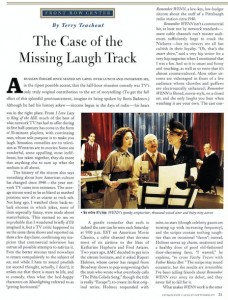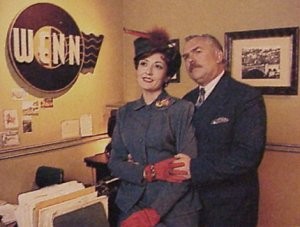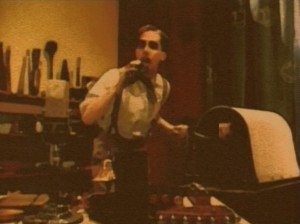 Rachel Symes wrote a very nice piece for Sunday’s New York Times about Rupert Holmes’ Remember WENN, which has the distinction of being the first original TV series ever to air on AMC.
Rachel Symes wrote a very nice piece for Sunday’s New York Times about Rupert Holmes’ Remember WENN, which has the distinction of being the first original TV series ever to air on AMC.
WENN made its cable-TV debut three years before The Sopranos and long before the palmy days of Mad Men and Breaking Bad. Today, though, it is almost entirely forgotten save by a fast-shrinking cadré of devoted enthusiasts.
As Symes explains:
A decade before AMC began to make its name as a home to highly rated and critically acclaimed TV shows, a tiny series set in a World War II-era radio station ran on the network from 1996 to 1998 before vanishing into the ether.
Remember WENN, a half-hour comedy-drama that aired on Saturday nights, made its debut 20 years ago on what was then known as American Movie Classics. It is now nearly impossible to find the show. WENN is not available to stream or on DVD. The only traces of it are bootleg YouTube clips. AMC’s first show remains one of its lost shows.
I was an avid fan of Remember WENN, so much so that I wrote about the series in my “Front Row Center” column for Civilization, the long-defunct magazine of the Library of Congress. That column, which was published in September of 1997, has never been reprinted, so I thought I’d post it here. It is now, needless to say, a period piece, but I hope you enjoy it anyway.
* * *
A Russian émigré once seized my lapel over lunch and assured me in the ripest possible accent that the half-hour situation comedy was TV’s only truly original contribution to the art of storytelling. (To get the full effect of this splendid pronouncement, imagine its being made by Boris Badenov.) Though he had his history askew—sitcoms began in the days of radio—his heart was in the right place. From I Love Lucy to King of the Hill, much of the best of what network TV has had to offer during its first half-century has come in the form of thirty-minute playlets with continuing casts whose sole and only purpose is to make you laugh. Situation comedies, in fact, are to television as the western is to movies: some are wonderful, some appalling, most indifferent, but taken together, they do more than anything else to sum up what the medium is all about.
The history of the sitcom also says something about how American culture has changed since 1948, the year network TV came into existence. The average sitcom used to be as bland as mashed potatoes; now it’s as coarse as rock salt. Not long ago, I watched three back-to-back sitcoms in which jokes, none of them especially funny, were made about masturbation. This seemed to me so improbable that I wondered briefly if I’d imagined it, but a TV critic happened to see the same three shows and reported on them a few days later, thereby demonstrating that it is no longer possible to satirize commercial television. Even the better sitcoms tend nowadays to return compulsively to the subject of sex, and while I hate to sound prudish (actually, I don’t), it strikes me that there is more to life, and to comedy, than what the bed-happy characters on Moonlighting referred to as “getting horizontal.”
 A gentle reminder that such is indeed the case can be seen each Saturday on American Movie Classics, a cable channel which devotes most of its air time to the likes of Humphrey Bogart and Fred Astaire. Two years ago, AMC decided to get into the sitcom business, and it asked Rupert Holmes, whose career has ranged from Broadway shows to pop songwriting (he’s the man who wrote what everybody calls “The Piña Colada Song,” though the title is really “Escape”), to create its first original series. Holmes responded with Remember WENN, a low-key, low-budget sitcom about the staff of a Pittsburgh radio station circa 1941.
A gentle reminder that such is indeed the case can be seen each Saturday on American Movie Classics, a cable channel which devotes most of its air time to the likes of Humphrey Bogart and Fred Astaire. Two years ago, AMC decided to get into the sitcom business, and it asked Rupert Holmes, whose career has ranged from Broadway shows to pop songwriting (he’s the man who wrote what everybody calls “The Piña Colada Song,” though the title is really “Escape”), to create its first original series. Holmes responded with Remember WENN, a low-key, low-budget sitcom about the staff of a Pittsburgh radio station circa 1941.
Remember WENN isn’t a hit, at least not by network standards—mere cable channels can’t muster audiences sufficiently large to crack the Nielsens—but its viewers are all but cultish in their loyalty. “Oh, that’s the smart show,” a very hip writer for a very hip magazine said when I mentioned that I was a fan. And so it is: smart and funny and touching, as well as so retro that it’s almost countercultural. Most sitcoms are videotaped in front of a live audience whose chortles and guffaws are electronically enhanced; Remember WENN is filmed, movie-style, on a closed set, and the only laughs you hear when watching it are your own. The cast contains no stars, and the scripts contain nothing naughtier than an occasional damn; instead, Holmes serves up charm, sentiment and a healthy dose of good old-fashioned door-slamming farce. “I wanted,” he explains, “to cross Fawlty Towers with Father Knows Best.” The recipe may sound eccentric, but the results are irresistible: I’ve been telling friends about Remember WENN ever since its debut, and they never fail to fall for it.
What makes WENN work is the utter self-assurance with which Holmes and his sterling cast undertake each week to put a fresh spin on the perfectly obvious. The characters are straight out of Sitcom 101: the spunky scriptwriter, the avuncular station manager, the blasé receptionist, the actor of a thousand voices, the over-the-hill actress and her philandering husband, the sound-effects man who never speaks a word. Nor is there anything particularly original about the stock situations in which these stick figures find themselves enmeshed. In one episode, the entire staff of WENN is placed under quarantine and forced to live at the station for a week, a plot device first seen on TV around the time J. Fred Muggs was stealing scenes from Dave Garroway. Yet that episode of Remember WENN was among the series’ most memorable—proof that there are no stale ideas, only stale writers.
A typical example of the quiet way in which Remember WENN goes about its funny business is a recent episode in which the hoity-toity Hilary Booth (who always wears a hat) and her unfaithful husband Jeff (who always wears an ascot) kiss, make up and decide to take a whirlwind train trip to Mexico to get married again. First we see them before the trip, cooing lovey-dovey dialogue in the break room: “I don’t think I can keep my hands to myself!” “If I were to go strictly with my primitive emotions, they’d have to call the police!” (This is as blue as Remember WENN gets.) Then, three minutes later, the furious post-honeymoon couple comes storming back into the station, exchanging the very same lines—only this time, it’s through clenched teeth. And there’s no laugh track to slam the point home: instead, Holmes trusts you to get it all by yourself.
 As if to add to its air of determined unfashionability, Remember WENN is filmed in New York, not Hollywood. To visit the set, you go to Rockefeller Center, catch the Q train to Queens, get off in the shadow of a housing project, walk past a bodega, a storefront church and a tire store, and cross the street when you see an ancient brick warehouse whose only mark of distinction is a turquoise sign identifying it as the home of Broadway Stages. That a TV show could be filmed in such bleak environs seems hard to believe, but only five doors separate the street and the set.
As if to add to its air of determined unfashionability, Remember WENN is filmed in New York, not Hollywood. To visit the set, you go to Rockefeller Center, catch the Q train to Queens, get off in the shadow of a housing project, walk past a bodega, a storefront church and a tire store, and cross the street when you see an ancient brick warehouse whose only mark of distinction is a turquoise sign identifying it as the home of Broadway Stages. That a TV show could be filmed in such bleak environs seems hard to believe, but only five doors separate the street and the set.
I passed through those five doors recently, and found myself in the midst of tightly organized chaos. “Prior to Broadway,” the twenty-eighth episode of Remember WENN was being filmed, and the joint was jumping. “Have you ever been on a TV set before?” a serious-looking man whispered in my ear. “Just remember—when they say quiet, they aren’t kidding.” Somebody shouted, “O.K., stand by. Rolling.” A bell rang twice, and I froze in my tracks. “Speed. Take seven. And…action.” Then I heard a strangely familiar woman’s voice. “A certain sponsor will have me six feet under if a certain star doesn’t show within the next ten seconds,” it said, and I thought: That’s Betty!
It was, of course, Amanda Naughton, who plays Betty Roberts, WENN’s spunky scriptwriter. But fact and fiction are sometimes hard to disentangle when you’re on the set of a TV series. In order to save money, each episode of Remember WENN is filmed in its entirety with a single camera on a single unit set, a life-size replica of a small-time radio station erected in the middle of the huge warehouse that is Broadway Stages. The set looks just like what it purports to be, so much so that it can be highly disorienting to sit down in an art deco chair, pick up a magazine and realize that you’re holding a 1941 copy of Screen Guide (“See How Much of a Ham Errol Flynn Is”). It’s even more confusing when you look up and see Betty Roberts and Hilary Booth chatting in the hallway, dressed in period outfits and looking just like themselves. You know Betty and Hilary—you see them every week—and for a moment, you forget that the spunky scriptwriter and the over-the-hill actress are actually Amanda Naughton and Melinda Mullins, two real-life people who are paid to read lines written by Rupert Holmes, another real-life person who is sitting in an office miles from here, busily batting out next week’s script.
 Amanda Naughton knows the difference between fact and fiction: she has acted on and off Broadway for most of her adult life. She also knows a dream gig when she sees one. “Yes, it’s a job, but there could be worse jobs,” she says with a huge grin, the enthusiastic words tumbling over one another. “The hours are long and you get tired, but it doesn’t really feel like a job job. It never has. When I got the audition and read the script for the first episode, I said, ‘Dang, I really want this!’ It read so beautifully that I laughed out loud, just reading it to myself. Rupert’s scripts aren’t har-de-har-har and the door falls off the hinges and everybody falls down and somebody gets a pie in the face. It was such a thrill to see something of that quality.”
Amanda Naughton knows the difference between fact and fiction: she has acted on and off Broadway for most of her adult life. She also knows a dream gig when she sees one. “Yes, it’s a job, but there could be worse jobs,” she says with a huge grin, the enthusiastic words tumbling over one another. “The hours are long and you get tired, but it doesn’t really feel like a job job. It never has. When I got the audition and read the script for the first episode, I said, ‘Dang, I really want this!’ It read so beautifully that I laughed out loud, just reading it to myself. Rupert’s scripts aren’t har-de-har-har and the door falls off the hinges and everybody falls down and somebody gets a pie in the face. It was such a thrill to see something of that quality.”
Naughton’s words are music to Holmes’ ears, for the things she praises about Remember WENN are exactly what he tries to do each time he sits down at the word processor, and what AMC has encouraged him to do right from the start. For Holmes, the fact that WENN has no laugh track is a symbol of what sets it apart from other sitcoms. “It’s not just that you don’t have to put up with that annoying, Benzedrine-induced mechanical laughter,” he says. “The tempo of the show can also be very different. You don’t have to say to the audience: This is funny, that’s funny. You can get away from hard-core jokes. You can throw away stuff. Sure, we still do all the farce things, and I find that there are often a lot of seamy emotions lurking beneath the surface of the show. But there’s a civility to it all—like the old TV comedies, Dick Van Dyke and Your Show of Shows and The Honeymooners, where people behaved like adults and were witty without having to fall on their faces.”
* * *
The first episode of Remember WENN, originally telecast on January 13, 1996:
